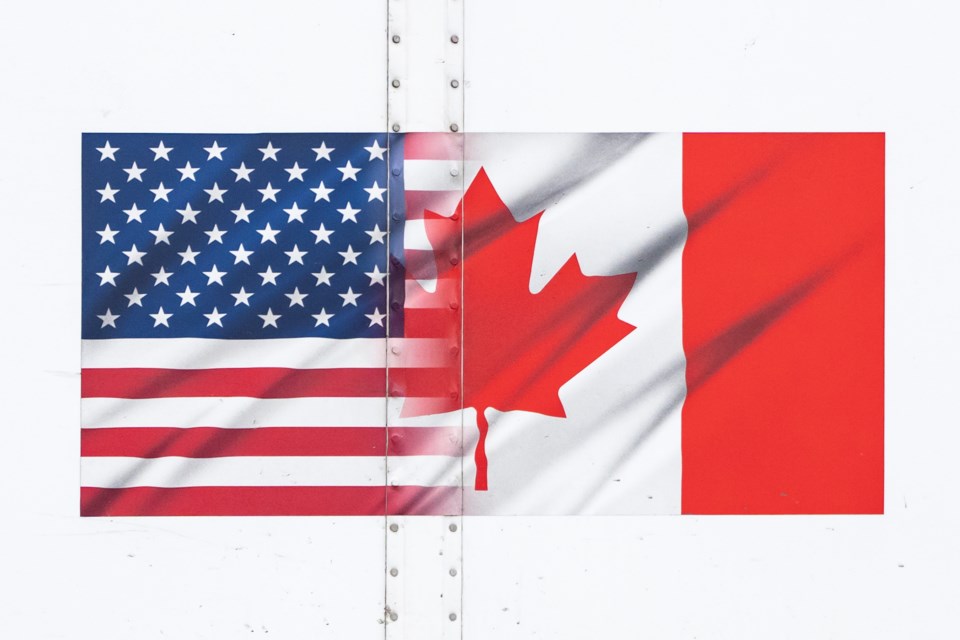What can you do to help defend Canada? What are you willing to sacrifice during the trade war?
These are the questions political party leaders are asking voters during the second week of the election campaign as Canada grapples with tariffs imposed by U.S. President Donald Trump.
“These are ways of saying, we've got this,” said Nomi Claire Lazar, professor at University of Ottawa’s graduate school of public and international affairs and author of "Out of Joint: Power, Crisis, and the Rhetoric of Time.”
“We're in control of the situation as much as we can be.”
All three major political parties have used some kind of wartime rhetoric over the past week, whether it’s using a Second World War policy as inspiration for a housing plan, the creation of a new bond program, or a focus on a “Canada First” strategy.
NDP Leader Jagmeet Singh announced Thursday that, if elected, he would launch new victory bonds — describing them as tax-free savings bonds “designed to put everyday Canadians in the driver’s seat of rebuilding the economy and resisting Trump’s attacks.”
It’s a wartime idea implemented during the first two world wars meant to spur fundraising efforts for the government as it engaged in expensive overseas combat. The Canada Savings Bonds program was finally scrapped in 2017 because they were too expensive to administer.
Singh acknowledged the cost would be in the tens of millions, but said that Canada is “in a type of war right now.”
“The threat of Donald Trump has made Canadians say, ‘What can I do to stand up and defend my country?’ And for those Canadians who want to contribute, here’s a way to do so.”
Liberal Leader Mark Carney on Thursday also had fighting words, saying the trade war with the United States will be hard on Canadians, and will “require sacrifices.”
“We have done hard, seemingly impossible things throughout our history,” he said in announcing retaliatory auto tariffs on the U.S. “We conquered the unconquerable at Vimy and Juno Beach.”
“We do not do things because they're easy, but because they are right. We will rise to meet this challenge, and we will emerge stronger.”
Lazar said the language being used by all political parties is different from that of typical crisis management, which focuses on a threat to a core value and calls attention to the problem rather than the use of words aimed at “giving people a sense of courage and strength and unity to face a challenge.”
“I do think this kind of rhetoric really is effective right now,” Lazar said. “It resonates with people because we really genuinely are facing a massive shift in how we understand ourselves with respect to our neighbours, in how we understand ourselves with respect to ourselves, how we're going to live going forward.”
“Nobody wants to hear when we're in this much trouble that we're broken.”
This frame of thinking would account for the shift in campaign strategy for the Conservative Party of Canada, who began campaigning prior to the election call on how Canada was “broken” after years of Liberal leadership. The party has since adapted their strategy, with a new slogan that says “Canada First For a Change.”
Sali Tagliamonte, University of Toronto professor of linguistics and Canada Research Chair in language variation and change, says she’s noticed more emphasis on terms like “leadership” and the “economy” throughout the election campaign. These words, she noted, especially when repeated often, can help change the perception of voters.
“What charismatic politicians can do is evoke very different emotions and judgments just by picking the words that can encapsulate their ideas,” she said. “I think it is important for people to realize that words are swaying their opinions.”
“It’s important for people to focus on the facts underlying the word choices.”
Canada isn’t always the audience
Political rhetoric can also change depending on the audience, Lazar noted, pointing to how Carney made a point of talking about how Canada’s relationship with the U.S. had changed and the country was diversifying its trade prior to his phone call with Trump.
“He's going in and saying, ‘We are already looking elsewhere. This war is functionally over. So yes, we'll continue to talk to you, but we're not speaking from a position of weakness.’ So with that rhetoric, I really think we ought to consider that the main audience is actually America, and that Canadians are the secondary audience.”
Alyson Fair, a senior consultant at Bluesky Strategy Group, said that political parties are framing the campaign around who can stand up to Trump best and who is the best candidate to deal with a “high stakes conflict.”
“It comes down to the fact that we are having to use terms like ‘fight’ and ‘battle’ and ‘defend’ because they stir up strong emotions among Canadians, among the voting public, and they rally support,” she said.
“We're using these wartime metaphors just to kind of justify the bold and extreme measures, and that we need to make sure that the stuff that we're dealing with requires urgent and decisive action by our leaders.”
Fair said it’s likely Canadians will hear similar rhetoric over the next week as Canada deals with the fallout of Trump’s “Liberation Day,” but after that, the narrative may simplify. Leaders, she added, may want to avoid the overuse of aggressive language, which she says “can desensitize the voter.”
“Unfortunately, that is just what is driving the narrative in this campaign, and hence why we're using this wartime rhetoric in this election,” she said. “I think it just comes down to making sure that you're balanced when you're doing it, and is it appropriate when you're doing it, instead of just constantly using it.”



